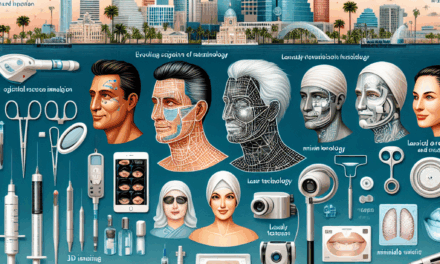The Impact of AI on Dermatology: Insights from Nextech
Artificial Intelligence (AI) is revolutionizing various fields, and dermatology is no exception. With the advent of advanced algorithms and machine learning techniques, AI is transforming how dermatologists diagnose, treat, and manage skin conditions. This article delves into the impact of AI on dermatology, with a particular focus on insights from Nextech, a leading provider of healthcare technology solutions. We will explore five key subtopics: the role of AI in diagnosis, treatment personalization, patient engagement, data management, and future trends in dermatology.
The Role of AI in Diagnosis
One of the most significant impacts of AI in dermatology is its ability to enhance diagnostic accuracy. Traditional diagnostic methods often rely on the subjective interpretation of visual symptoms, which can lead to misdiagnosis. AI algorithms, particularly those based on deep learning, can analyze images of skin lesions with remarkable precision.
For instance, a study published in the journal *Nature* demonstrated that an AI system could match or even exceed the diagnostic accuracy of dermatologists in identifying skin cancer. The system was trained on a dataset of over 130,000 images of skin lesions, allowing it to learn the subtle differences between benign and malignant conditions.
- Image Recognition: AI systems utilize convolutional neural networks (CNNs) to process and analyze images. These networks can identify patterns and features that may be overlooked by the human eye.
- Speed and Efficiency: AI can analyze images in seconds, significantly reducing the time required for diagnosis. This rapid assessment is particularly beneficial in busy clinical settings.
- Consistency: Unlike human practitioners, AI systems do not suffer from fatigue or cognitive bias, leading to more consistent diagnostic outcomes.
Moreover, AI can assist in triaging patients based on the severity of their conditions. For example, Nextech’s AI-driven tools can prioritize cases that require immediate attention, ensuring that patients receive timely care. This capability is especially crucial in dermatology, where early intervention can significantly improve patient outcomes.
However, while AI shows great promise in enhancing diagnostic accuracy, it is essential to recognize its limitations. AI systems are only as good as the data they are trained on. If the training dataset is biased or lacks diversity, the AI may produce skewed results. Therefore, ongoing research and development are necessary to ensure that AI tools are reliable and applicable across diverse populations.
Treatment Personalization
AI is not only transforming diagnosis but also revolutionizing treatment personalization in dermatology. Personalized medicine aims to tailor treatments based on individual patient characteristics, including genetic makeup, lifestyle, and specific skin conditions. AI plays a crucial role in this process by analyzing vast amounts of data to identify the most effective treatment options for each patient.
Nextech’s AI solutions leverage patient data, including medical history, treatment responses, and demographic information, to recommend personalized treatment plans. For instance, AI algorithms can analyze previous treatment outcomes to predict which therapies are likely to be most effective for a new patient with a similar profile.
- Predictive Analytics: AI can analyze historical data to predict how a patient will respond to a particular treatment. This predictive capability allows dermatologists to make informed decisions about treatment options.
- Real-Time Monitoring: AI-powered applications can monitor patients’ progress in real-time, adjusting treatment plans as necessary. This dynamic approach ensures that patients receive the most effective care throughout their treatment journey.
- Integration with Genomics: As genomic data becomes more accessible, AI can analyze genetic information to identify specific mutations associated with skin conditions. This information can guide targeted therapies, improving treatment efficacy.
For example, in the case of psoriasis, AI can help dermatologists identify the most effective biologic therapies based on a patient’s unique genetic profile and previous treatment responses. This level of personalization not only enhances treatment outcomes but also improves patient satisfaction and adherence to treatment plans.
Despite these advancements, challenges remain in implementing personalized treatment strategies. Data privacy concerns, the need for robust clinical validation, and the integration of AI tools into existing workflows are critical issues that must be addressed to fully realize the potential of AI in personalized dermatology.
Enhancing Patient Engagement
AI is also playing a pivotal role in enhancing patient engagement in dermatology. Engaged patients are more likely to adhere to treatment plans, attend follow-up appointments, and actively participate in their care. AI-driven tools can facilitate this engagement in several ways.
Nextech’s patient engagement solutions utilize AI to provide personalized communication and education to patients. For instance, AI chatbots can answer common questions about skin conditions and treatments, providing patients with immediate access to information. This accessibility empowers patients to take an active role in their healthcare.
- Teledermatology: AI-powered teledermatology platforms enable patients to consult with dermatologists remotely. This convenience is particularly beneficial for individuals in rural areas or those with mobility issues.
- Appointment Reminders: AI systems can send automated reminders for appointments and follow-ups, reducing the likelihood of missed visits and ensuring continuity of care.
- Patient Education: AI can curate educational content tailored to individual patients, helping them understand their conditions and treatment options better.
Moreover, AI can analyze patient feedback and engagement metrics to identify areas for improvement in the patient experience. For example, if a significant number of patients express confusion about a particular treatment, dermatology practices can address this issue through targeted education efforts.
However, while AI enhances patient engagement, it is essential to maintain a human touch in healthcare. Patients often value the personal connection with their healthcare providers, and AI should complement, rather than replace, this relationship. Striking the right balance between technology and human interaction is crucial for fostering meaningful patient engagement.
Data Management and Analysis
The integration of AI in dermatology also significantly impacts data management and analysis. Dermatology practices generate vast amounts of data, including patient records, imaging studies, and treatment outcomes. Effectively managing and analyzing this data is essential for improving patient care and operational efficiency.
Nextech’s AI solutions streamline data management by automating data entry, organization, and analysis. This automation reduces the administrative burden on healthcare providers, allowing them to focus more on patient care.
- Data Integration: AI can integrate data from various sources, including electronic health records (EHRs), imaging systems, and laboratory results. This comprehensive view of patient data enables dermatologists to make more informed decisions.
- Outcome Analysis: AI algorithms can analyze treatment outcomes across large patient populations, identifying trends and patterns that inform best practices in dermatology.
- Predictive Modeling: By analyzing historical data, AI can create predictive models that forecast patient outcomes based on specific treatment plans. This capability allows dermatologists to proactively address potential complications.
For example, a dermatology practice using Nextech’s AI tools can analyze data from thousands of patients to identify which treatments are most effective for specific skin conditions. This data-driven approach enhances clinical decision-making and improves patient outcomes.
However, data management in healthcare also raises concerns about privacy and security. As practices increasingly rely on AI to manage sensitive patient information, ensuring compliance with regulations such as HIPAA is paramount. Dermatology practices must implement robust security measures to protect patient data while leveraging the benefits of AI.
Future Trends in Dermatology
The future of dermatology is undoubtedly intertwined with the continued advancement of AI technologies. As AI systems become more sophisticated, we can expect several trends to shape the field of dermatology in the coming years.
One significant trend is the increasing use of AI for early detection of skin cancers. As AI algorithms improve, they will become more adept at identifying subtle changes in skin lesions that may indicate malignancy. This capability will enable dermatologists to intervene earlier, potentially saving lives.
- Integration with Wearable Technology: The rise of wearable devices equipped with sensors for monitoring skin health will provide valuable data for AI analysis. These devices can track changes in skin conditions in real-time, allowing for proactive management.
- AI-Driven Clinical Trials: AI can streamline the clinical trial process by identifying suitable candidates and predicting treatment responses. This efficiency will accelerate the development of new therapies in dermatology.
- Global Health Initiatives: AI has the potential to improve access to dermatological care in underserved regions. Teledermatology and AI-powered diagnostic tools can bridge the gap in healthcare disparities.
Moreover, as AI continues to evolve, ethical considerations will become increasingly important. Dermatologists and healthcare providers must navigate the ethical implications of AI, including issues related to bias, transparency, and accountability. Establishing guidelines and best practices for the responsible use of AI in dermatology will be essential for maintaining patient trust and ensuring equitable care.
Conclusion
The impact of AI on dermatology is profound and multifaceted. From enhancing diagnostic accuracy to personalizing treatment plans and improving patient engagement, AI is transforming how dermatologists deliver care. Insights from Nextech highlight the potential of AI-driven solutions to streamline data management and analysis, ultimately leading to better patient outcomes.
As we look to the future, the integration of AI in dermatology will continue to evolve, bringing new opportunities and challenges. By embracing these advancements while addressing ethical considerations, dermatologists can harness the power of AI to improve patient care and advance the field of dermatology.
In summary, the key takeaways from this exploration of AI’s impact on dermatology include:
- The role of AI in enhancing diagnostic accuracy through advanced image recognition.
- The potential for personalized treatment plans based on predictive analytics and real-time monitoring.
- The importance of patient engagement facilitated by AI-driven communication tools.
- The significance of effective data management and analysis in improving clinical decision-making.
- The future trends in dermatology, including early detection of skin cancers and the integration of wearable technology.
As AI continues to shape the landscape of dermatology, it is crucial for healthcare providers to stay informed and adapt to these changes, ensuring that they provide the highest quality of care to their patients.




